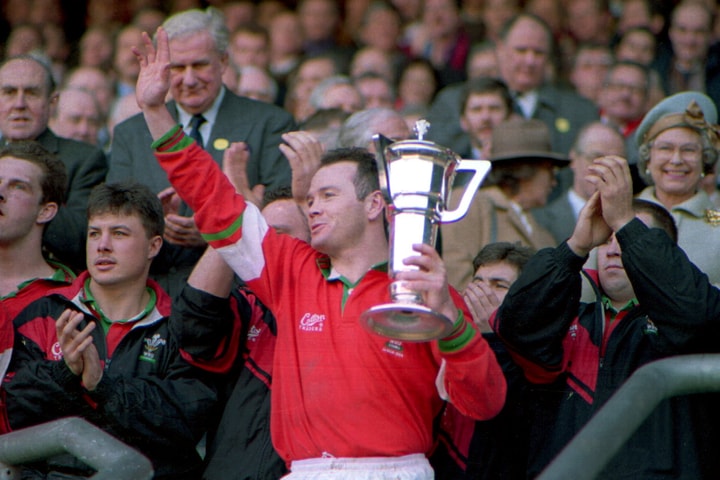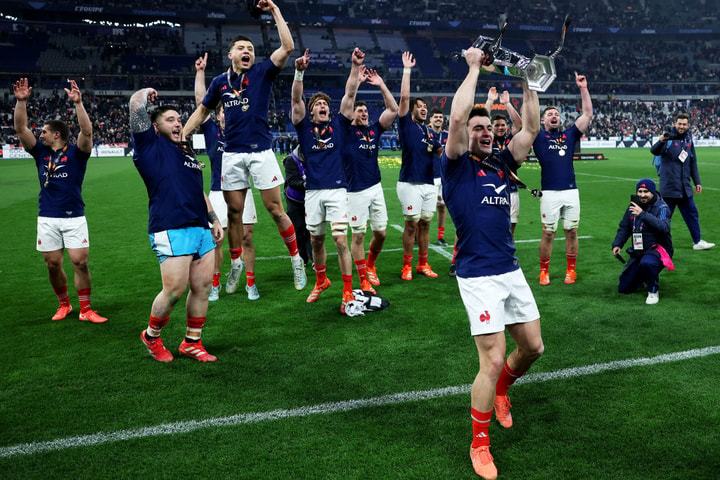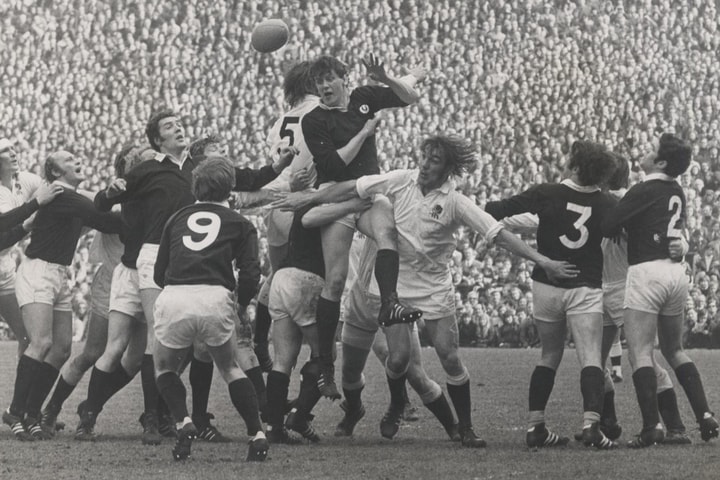World Rugby Museum researcher Richard Steele shares his memories of the 1990 Calcutta Cup match at Murrayfield…

From The Vaults
David Sole's Jersey
The recent acquisition by the World Rugby Museum of former Scottish captain David Sole's match jersey evoked many memories of one of the greatest days in Scottish rugby. Few matches in the long history of the International Championship have aroused such anticipation as the Grand Slam clash between Scotland and England at Murrayfield on Saturday 17 March 1990.

I was working in arts administration in central London and I left my office early to catch the afternoon train from Kings Cross to Edinburgh on the day before the match. I had been fortunate in securing a ticket for the Calcutta Cup match a month earlier, long before I realised it would be the first time that two countries would meet at the end of the season with the Triple Crown, the Championship and the much coveted Grand Slam at stake.
I had lived in Edinburgh for six years through the late 1970s and early '80s and had seen Scotland play many matches with varying success, but I was quietly confident that an England side playing an exuberant brand of rugby under Will Carling's captaincy would win the day just as their forebears had done at Murrayfield under Bill Beaumont's captaincy ten years earlier - and I had been there that day too. The 1990 Scotland team had been less overtly impressive, but their rugged style had seen off their three opponents and they had home advantage for this final match.
There was a tense atmosphere in Edinburgh on the morning of the match. Although my Scottish friends all acknowledged the quality of the England performances in the Championship, they were in retrospect ominously reticent about Scotland's chances. A few references to the number of British Lions in the Scotland side, the boot of Gavin Hastings and the quality of the back row were as much as they were prepared to offer, so I remained optimistic about England's chances on the walk among an expectant crowd from the centre of the city to the ground.

David Sole leads scotland out
Tickets for the match had sold out many days before and the match programmes sold out a quarter of an hour before the game even started. Even so, the tension was ratcheted up to a scarcely believable notch when the Scottish and British Lions prop David Sole led his team out in slow single file to the roars of the Scottish supporters in the crowd.
It was a match of great ebb and flow and it was obvious early on that the Scottish forwards were proving a real handful. In particular, the back row of John Jeffrey, Derek White and Finlay Calder were giving little quarter in the tight exchanges where the reassuring presence of the mountainous Dean Richards was badly missed. Scotland took the lead with a couple of early penalties from Craig Chalmers but a magnificent thrust through the centre by Carling expertly finished by his centre partner Jeremy Guscott calmed English nerves. Although full back Simon Hodgkinson missed the conversion and Chalmers added another penalty for Scotland to lead 9-4 before half-time, I still think that the majority of English supporters believed that the magnificent running rugby of earlier in the season would take England through to carry off all the prizes on offer.
Any complacency among the English supporters was shattered two minutes after half-time when England lost the ball at the back of a scrum on halfway. Scotland won the ensuing scrum and their scrum half Gary Armstrong put full back Gavin Hastings away down the blind side. When challenged he kicked ahead for the Scottish right wing to chase and Tony Stanger caught the ball and dived over to score near the right-hand corner. The grounding looked slightly suspicious but there was no TMO in those days and the referee saw no reason not to award the try. The conversion was missed but all of a sudden Scotland led 13-4 and England faced a steep pathway to claw their way back into the game.
And they never managed it. The remaining thirty five minutes rank among the most tense I have ever experienced in watching international rugby. England tried everything they could to pull the game back but they were unable to release their formidable backline to any significant effect. Their only score in the second half was a penalty goal kicked by Simon Hodgkinson in the 55th minute because the Scottish defence snuffed out every onslaught with exceptional tackling from the two Hastings brothers and the Scottish back row. Even the great Rory Underwood, scorer of four tries in England's 1990 campaign, was reduced to being a passenger on the wing and given barely a sniff of the try line.

Chalmers and Hastings
As the minutes ticked away it became clear that it was not be England's day. My emotions were mixed as I had so many Scottish friends and family but I think that most of the English supporters knew that their team had been beaten by the better and definitely cannier side on the day. Scotland thoroughly deserved their third Grand Slam and it was a major learning curve for an England side which would go on to win consecutive Grand Slams in 1991 and 1992 and reach the Rugby World Cup Final in 1991.
My journey home sitting up on the night sleeper back to London was an experience. After a number of beers at an Edinburgh rugby clubhouse, where as an Englishman I was generously permitted entry, and in more than one hostelry on the way to Waverley station, I encountered an extremely noisy batch of soccer supporters who I still think to this day were blissfully unaware of the Scottish rugby triumph.
They sang their songs all the way back to Kings Cross and I finally arrived home in Twickenham quite exhausted in time for breakfast at which I was greeted by my Scottish wife with just two words - "we won!"
About the Author - A professional musician and arts administrator, Richard Steele has been on the committee of the World Rugby Museum at Twickenham since 2005 and is the co-author of the RFU's 150th anniversary book England Rugby 150 Years.




